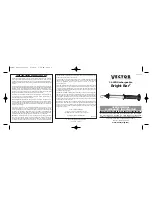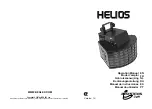
5 Pin XLR (Plug)
Pin 1: GND(Sheild)
Pin 2: Signal(-)
Pin 3: )
Pin 4: N/C
Pin 5: N/C
3 XLR
(S
)
Pin 1: GND(Sheild)
Pin 2: Signal(-)
Pin 3: )
Pin ocket
5 Pin XLR (Socket)
Pin 1: GND(Sheild)
Pin 2: Signal(-)
Pin 3: )
Pin 4: N/C
Pin 5: N/C
3
XLR (Plug)
Pin 1: GND(Sheild)
Pin 2: Signal(-)
Pin 3: )
Pin
DMX Start Address
To place the fixture in DMX mode, press the MODE key, then using the UP/DOWN keys
get to the Address Menu Option. Press ENTER and using the UP/DOWN buttons, set the
start address number for this particular unit in the DMX chain. Once selected, press
ENTER again to save your selection. More than one fixture may have the same start
address, but they will behave the same. Giving a unique start address that does not
overlap with any other units allows you to individually control that fixture’s features fully.
Never allow channels to overlap. You will need to select the number of channels you
wish the fixture to use first. Your choices are 6, 9, 15, 24 or 27 channel modes. This will
determine the spacing of channels you will need to avoid overlapping of channels when
selecting your start addresses.
Example
Select Start Addresses for 4 fixtures each requiring 6 channels of DMX (6
channel mode).
For this example, start with the first unit set to the first possible Start Address =
1
. This fixture
occupies DMX channels 1 thru 6. The next DMX channel available for a Start Address is found
by adding the previous fixture’s Start Address to its channel requirement: 1+6=
7
. To maximize
channel usage, we will leave no empty channels between fixtures so the second Start Address is
set to DMX channel 7 and that fixture occupies channels 7 thru 12. The third fixture will be
addressed 7+6=
13
and occupy channels 13 thru 18. The last fixture is addressed 13+6=
19
and
will occupy channels 19 thru 24. Thus, 4 fixtures using 6 channels each have Start Addresses of
1, 7, 13
and
19
and the next free channel in the system is 19+6=25.
DMX Channel Assignments
This fixture features 5 different DMX Channel modes: 6, 9, 15, 24 and a 27 channel
mode. Using the 6 channel mode provides the least granular control, and relatively uses
the least number of DMX channels. The different channel assignments and values are
shown below in the following tables. The 6 channel mode provides a full description of all
the values and functions. All other modes of more channels allow additional “section”
control of the bar by dividing the bar into smaller sections of 3 RGB TriLED groups.
Regardless of DMX mode, channel 1 functions are the same in all DMX modes selected,
so it will only be described once below in the 6 channel mode.
Note that the channel
order maybe different for each of the modes.
DMX Channel Mode Descriptions
10
































